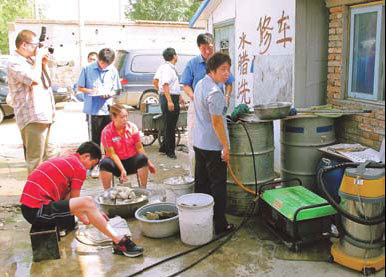City out to mop up water waste
New regulations are in the pipeline to prevent the squandering of water by the city's car-washing industry.
The Beijing Water Authority says it is worried about not just for the volume of H2O heading down the drain, but the type.
 |
|
Officials inspect an illegal car-washing booth that was using well water for car washing. [China Daily] |
According to the Beijing Water Conservation Management Practices released in 2005, car-washing businesses must have facilities to reuse water and use reclaimed water.
"Some illegal shops just steal water from self-supply wells, causing huge waste because this type of water is clean and could be used more productively by other residents," said Wang Zhengliang, vice-director of the Beijing Water Administration and Law-enforcement Office, during a crackdown on illegal car-washing businesses on Tuesday.
The amendment of the 2005 the Beijing Water Conservation Management Practices will be released at the end of 2010 and is set to include new items specifically aimed at the car-washing industry.
"New and tougher sanctions and incentives will be introduced in this version," said Yu Yaping, a press officer with the Beijing Water Authority.
Beijing News reported that, in 2009, the city's car-washing industry used around 30 million tons of water - equivalent to 12 of the Summer Palace's Kunming lakes.
The report said none of the 30 million tons was reused by the car-washing operations.
"This would not be a waste if the 30 million tons was all reclaimed water, or at least tap water that was being recycled," said Liu Lizhi, a press officer with the Beijing Water Authority.
"Reclaimed water is clean enough to wash cars with and it will be directed into rivers anyway if it is not used."
The purchase of reclaimed water costs only one yuan per ton if it is transported to the user through existing channels and 10 yuan a ton if it is transported to the user in trucks.
"Anyway, it is still a lot cheaper than using normal water, which costs more than 60 yuan per ton," said Wang.
But, while using reclaimed water may not be expensive, many car-wash owners complain that installing facilities to reuse water onsite is prohibitive.
Xing Yulong, director of a car-washing operation that extends to 14 outlets in Beijing uses equipment to capture and reuse water. He said each unit costs 180,000 yuan.
"Another few thousand yuan is needed every half a year to change the enzyme used in the equipment because it will gradually cease to be effective," he said.
He said such an investment is too much for smaller operations to bear.
Hu He, a regular customer at an illegal car-wash that was officially warned by Beijing Water Authority on Tuesday, said he liked going there because it was cheap.
"Five yuan here is enough, but big chain stores could cost me 40 yuan every time," he said.
"I have to have my car washed every week due to the bad air quality in Beijing. I can't afford that much money."
Wang, however, said he hopes people will think about the reasons why cheap car-washes are so cheap, particularly the damage they do to the environment.
"They are cheap because they steal domestic water almost for free," he said.
"Also, they have no license for emitting waste water and just pour it into the gully trap, which means it ends up in rivers in the city."
Go to Forum >>0 Comments
 Add your comments...
Add your comments...
- User Name Required
- Your Comment
- Racist, abusive and off-topic comments may be removed by the moderator.
 0
0 






